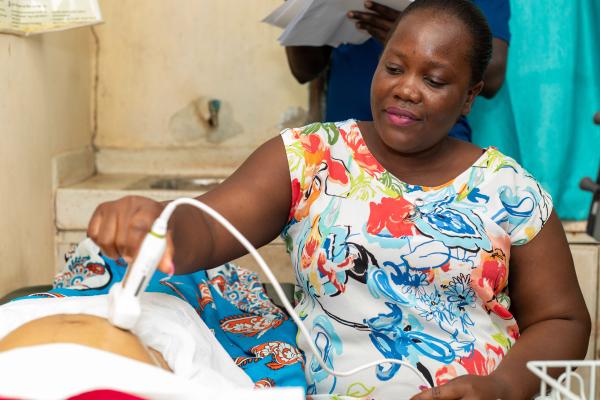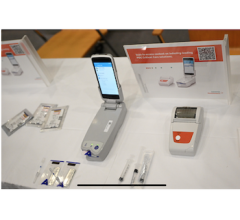
Training underway with new AI-driven ultrasound-based technology prototype
November 7, 2023 — Royal Philips, a global leader in health technology, today announced it has received a second round of funding from the Bill & Melinda Gates Foundation to accelerate global adoption of AI algorithms on Philips Lumify Handheld Ultrasound. By using AI to simplify key measurements to identify abnormalities during pregnancy, training time to use the ultrasound system can be reduced from weeks to just hours, hugely expanding the pool of frontline health workers who can learn to use the technology and integrate it into routine care.
Results since the Bill & Melinda Gates Foundation provided its first phase of grant funding in 2021 have shown a positive impact in Kenya where the technology has helped drive better-informed decision-making when triaging pregnant women in rural underserved communities. The new phase of funding will support the deployment of the AI-assisted tool to underserved communities globally.
Each day, nearly 800 women around the world die from preventable causes related to pregnancy and childbirth [1], with nearly 95% of all maternal deaths occurring in low- and lower-middle-income countries in 2020. Care provided by skilled health professionals before, during and after childbirth can help save the lives of women and newborns worldwide [1].
New AI-guided algorithms assist in risk-based triaging
The World Health Organization recommends at least one ultrasound scan before 24 weeks of gestation for pregnant women to evaluate gestational age and improve detection of fetal abnormalities with greater confidence [2]. With this latest development, Philips Lumify Handheld Ultrasound will be the first point-of-care ultrasound (POCUS) device to be introduced commercially to assist non-expert users by automating image acquisition or image interpretation for a comprehensive set of obstetrics measurements, increasing quality access to early fetal ultrasound scans.
“Ultrasound is the first tool of choice to scan pregnant women, but it also requires training to understand how to scan properly and correctly in order to make the right image interpretations,” said Jeff Cohen, General Manager of Ultrasound at Philips. “By supporting front-line healthcare workers such as midwives to identify potential problems in pregnancy at an early stage, we aim to significantly reduce the number of women who die because of pregnancy. During this next phase, working with the Bill & Melinda Gates Foundation, we will bring this innovation as a commercial offering to the market to help increase quality access to care and improve maternal health in underserved and rural communities in developed and developing countries worldwide.”
“One of our key areas of focus is to build partnerships that bring together resources, expertise, and vision – working with organizations around the world to identify issues, find answers, and drive change,” said Dr. Rasa Izadnegahdar, Director, Maternal, Newborn and Child Health Discovery & Tools at the Bill & Melinda Gates Foundation. “A critical goal of our work at the Bill & Melinda Gates Foundation is to bring health technology to underserved areas of the world to help prevent women from dying in childbirth – an issue that is critical in high-income countries like the US and UK as well.”
Prototype results show increased confidence for midwives
During a trial period in Kenya, feedback on the new tool has shown positive impact. Thanks to digitalization, informatics, and AI, interpretation of the images is not required by the operator. Weeks of training for midwives have been reduced to hours, without negatively affecting confidence in triage. Expectant moms also find it comforting to know how their baby is progressing. Depending on the results, patients can be referred to a credentialed sonographer for image review and further investigation if needed.
“With this disruptive technology, we are introducing a new way of ultrasound scanning where midwives and non-expert users are guided by the algorithm to give them access to critical information they need most when triaging pregnant women in underserved areas, and rural settings,” said Matthijs Groot Wassink, General Manager for Point of Care and Obstetric Ultrasound at Philips. “The prototype identifies six critical parameters for high-risk assessments to help improve the health of both mom and baby, such as gestational age and placenta location. With the automated AI capabilities built into Philips Lumify, frontline workers can identify abnormalities earlier, helping to increase confidence and comfort of the mother in any decisions or care pathways she decides to pursue or not.”
For more information: www.philips.com
Find more RSNA23 conference coverage here
References:
[1] https://www.who.int/news-room/fact-sheets/detail/maternal-mortality
[2] https://www.who.int/publications/i/item/9789241549912


 February 06, 2026
February 06, 2026 









